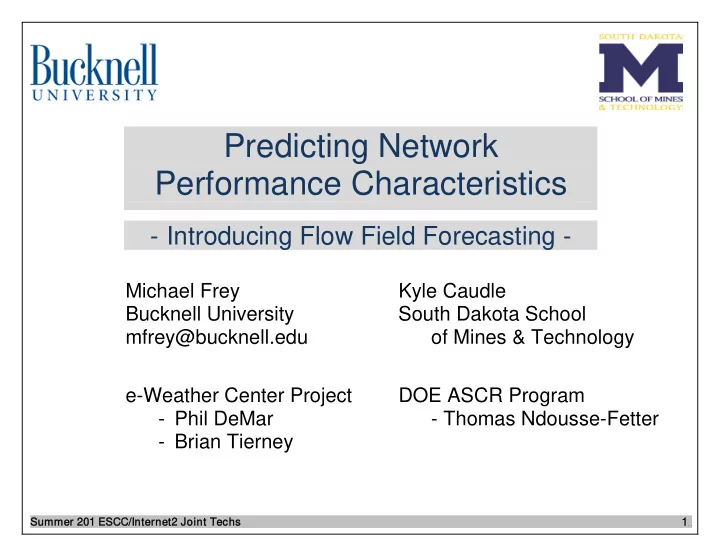

Predicting Network Performance Characteristics - Introducing Flow Field Forecasting - Michael Frey Kyle Caudle Bucknell University South Dakota School mfrey@bucknell.edu of Mines & Technology e-Weather Center Project DOE ASCR Program - Phil DeMar - Thomas Ndousse-Fetter - Brian Tierney Summer er 201 201 E ESCC/Inter ernet et2 J 2 Joint T Tec echs 1 . .
Outline • The NPC forecasting problem • Standard forecasting tools • Flow field forecasting • Demonstrations • Present status Summer er 2 201 01 ESCC/Inter ernet et2 J 2 Joint T Techs 2 . . . .
The problem Given: A sequence of observations of an NPC along a network path with given observation times NPC ? ? t 1 t 2 t 3 t 4 t 5 t 6 t 7 t N 1 t N t F t F Goal: Predict the NPC reliably at time F in the near future t Extrapolate plausibly at F t beyond the near future Summer er 2 201 01 ESCC/Inter ernet et2 J 2 Joint T Techs 3 . . . .
Beyond near future Stable underlying mechanism Non-stable underlying mechanism Reliable prediction beyond near future Unreliable prediction beyond near future David Keeling CO2 Data - Mauna Loa, Hawaii Euro - US Dollar Exchange Rate 400 $1.60 Sole Atmospheric CO2 (ppm) 390 Measured monthly currency $1.50 of EU 380 $1.40 370 Euro price $1.30 360 350 $1.20 340 $1.10 330 $1.00 320 $0.90 310 Recorded daily, at close 1960 1970 1980 1990 2000 2010 $0.80 Year 1/1/01 1/1/03 1/1/05 1/1/07 1/1/09 1/1/11 Channel Untilization - Los Angeles/Houston Backbone Sunspot cycle 200 U.S. National Oceanic and Los Angeles Inbound (Gbits/sec) Atmospheric Administration 4 150 3 Count 100 2 50 1 rt r.losa.int ernet 2.edu--ge-6/ 1/ 0.0 BACKBONE: LOSA-HOUS 1 | 0 0 12-HOUS-LOSA-10GE-05581 noon 20:00 04:00 noon 20:00 04:00 noon 1700 1750 1800 1850 1900 1950 2000 Fri 24 Jun 2011 12:00:00 EDT - Sun 26 Jun 2011 12:00:00 EDT Year Summer er 2 201 01 ESCC/Inter ernet et2 J 2 Joi oint nt T Techs hs 4 . . . .
Desiderata Error estimate – reliably estimates near-future prediction error Plausible – plausibly extrapolates beyond near future Robust – accepts non-uniformly spaced observation times Autonomous – no human guidance Fast – computationally efficient; e.g., no multi- dimensional numerical optimizations Accommodative – capable of exploiting “parallel” data Summer er 2 201 01 ESCC/Inter ernet et2 J 2 Joint T Techs 5 . . . .
Available Tools Gaussian process regression Semiparametric regression Spectral/wavelet methods Traditional regression ARIMA forecasting Moving averages Neural networks ??? Error estimate X √ √ X √ √ X Plausible X X X X √ X √ Robust X √ X √ √ √ X Autonomous √ X X √ X √ √ Fast √ √ X X X √ √ Accommodative X √ X √ X X X Summer er 2 201 01 ESCC/Inter ernet et2 J 2 Joint T Techs 6 . . . .
New Forecasting Method Gaussian process regression Semiparametric regression Spectral/wavelet methods Traditional regression Flow field forecasting ARIMA forecasting Moving averages Neural networks Error estimate X √ √ X √ √ X √ Plausible X X X X √ X √ √ Robust X √ X √ √ √ X √ Autonomous √ X X √ X √ √ √ Fast √ √ X X X √ √ √ Accommodative X √ X √ X X X √ Summer er 2 201 01 ESCC/Inter ernet et2 J 2 Joint T Techs 7 . . . .
Flow Field Forecasting - 1 Step 1: Extract skeleton = + ε Data Y S n n n κ κ κ κ 0 1 2 3 K = Skeleton s s s s s 0 1 2 3 K δ δ δ δ δ 0 1 2 3 K = Noise • Semi-parametric regression • Use only skeleton for forecast • Data reduction + Skeleton • Original time spacing not relevant Summer er 2 201 01 ESCC/Inter ernet et2 J 2 Joint T Techs 8 . . . .
Flow Field Forecasting - 2 Step 2: Interpolate flow field Summer er 2 201 01 ESCC/Inter ernet et2 J 2 Joint T Techs 9 .
Flow Field Forecasting - 3 Step 3: Build to the future Skeleton K 1 K 2 K 3 d 0 d 1 d 2 d K s 0 s 1 s 2 s K s K 1 s K 2 s K 3 0 1 2 K K 1 K 2 K 3 flowfield interpolation Summer er 2 201 01 ESCC/Inter ernet et2 J 2 Joint T Techs 10 10 . . . .
Demonstration 1 - Flow field contains much applicable information - Prediction error builds slowly Su Summer 201 ESC ESCC/Inter ernet et2 J 2 Joint Tec echs 11 11 . . . .
Demonstration 2 - Flow field contains little applicable information - Prediction error builds quickly Summer er 2 201 01 ESCC/Inter ernet et2 J 2 Joint Tec echs 12 . . . .
Current Status • Python code undergoing final testing For a copy mfrey@bucknell.edu • Integration with e-Weather Center can begin in September 2011 • “Introducing Flow Field Forecasting” by Frey and Caudle For a copy mfrey@bucknell.edu Summer er 2 201 01 ESCC/Inter ernet et2 J 2 Joint Tec echs 13 . . . .
Recommend
More recommend